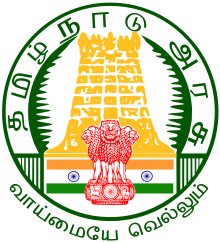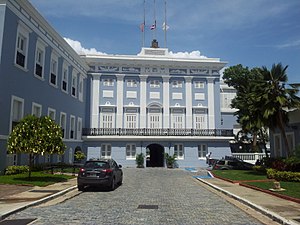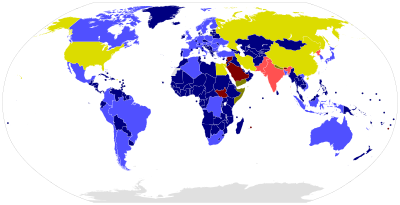Portal:Politics
| Main | Topics and categories | Tasks and projects |
The Politics portal
Politics (from Ancient Greek πολιτικά (politiká) 'affairs of the cities') is the set of activities that are associated with making decisions in groups, or other forms of power relations among individuals, such as the distribution of status or resources. The branch of social science that studies politics and government is referred to as political science.
Politics may be used positively in the context of a "political solution" which is compromising and non-violent, or descriptively as "the art or science of government", but the word often also carries a negative connotation. The concept has been defined in various ways, and different approaches have fundamentally differing views on whether it should be used extensively or in a limited way, empirically or normatively, and on whether conflict or co-operation is more essential to it.
A variety of methods are deployed in politics, which include promoting one's own political views among people, negotiation with other political subjects, making laws, and exercising internal and external force, including warfare against adversaries. Politics is exercised on a wide range of social levels, from clans and tribes of traditional societies, through modern local governments, companies and institutions up to sovereign states, to the international level.
In modern nation states, people often form political parties to represent their ideas. Members of a party often agree to take the same position on many issues and agree to support the same changes to law and the same leaders. An election is usually a competition between different parties.
A political system is a framework which defines acceptable political methods within a society. The history of political thought can be traced back to early antiquity, with seminal works such as Plato's Republic, Aristotle's Politics, Confucius's political manuscripts and Chanakya's Arthashastra. (Full article...)
Selected article
The Convention of 1832 was the first political gathering of colonists in Mexican Texas. Delegates sought reforms from the Mexican government and hoped to quell the widespread belief that settlers in Texas wished to secede from Mexico. The convention was the first of a series of unsuccessful attempts at political negotiation that eventually led to the Texas Revolution. On October 1, 1832, 55 political delegates met at San Felipe de Austin to petition for changes in the governance of Texas. Notably absent was any representation from San Antonio de Béxar, where many of the native Mexican settlers (Tejanos) lived. The delegates elected Stephen F. Austin (pictured), a highly respected immigrant, as president of the convention. Delegates passed a series of resolutions requesting, among other things, a repeal of the immigration restrictions, a three-year exclusion from custom duties enforcement, permission to form an armed militia and independent statehood. They also voted themselves the power to call future conventions. Before the petition could be delivered to Mexico City, the political chief of Texas, Ramón Músquiz, ruled that the convention was illegal and annulled the resolutions. In a compromise, the ayuntamiento (city council) of San Antonio de Béxar drafted a new petition with similar language to the convention resolutions and submitted it through proper legal channels. Músquiz forwarded the new document to the Mexican Congress. (more...)
Featured picture

The western (front) side of the United States Capitol. The U.S. Capitol serves as the location for Congress, the legislative branch of the U.S. federal government. It is located in Washington, D.C., on top of Capitol Hill at the east end of the National Mall. The building is marked by its central dome above a rotunda and two wings. It is an exemplar of the Neoclassical architecture style.

The lifetime of British writer, philosopher, and feminist Mary Wollstonecraft (1759–1797) encompassed most of the second half of the eighteenth century, a time of great political and social upheaval throughout Europe and America: political reform movements in Britain gained strength, the American colonists successfully rebelled, and the French Revolution erupted. Wollstonecraft experienced only the headiest of these days, not living to see the end of the democratic revolution when Napoleon crowned himself emperor. Although Britain was still revelling in its mid-century imperial conquests and its triumph in the Seven Years' War, it was the French revolution that defined Wollstonecraft's generation. As poet Robert Southey later wrote: "few persons but those who have lived in it can conceive or comprehend what the memory of the French Revolution was, nor what a visionary world seemed to open upon those who were just entering it. Old things seemed passing away, and nothing was dreamt of but the regeneration of the human race."
Part of what made reform possible in Britain in the second half of the eighteenth century was the dramatic increase in publishing; books, periodicals, and pamphlets became much more widely available than they had been just a few decades earlier. This increase in available printed material helped facilitate the rise of the British middle class. Reacting against what they viewed as aristocratic decadence, the new professional middle classes (made prosperous through British manufacturing and trade), offered their own ethical code: reason, meritocracy, self-reliance, religious toleration, free inquiry, free enterprise, and hard work. They set these values against what they perceived as the superstition and unreason of the poor and the prejudices, censorship, and self-indulgence of the rich. They also helped establish what has come to be called the "cult of domesticity", which solidified gender roles for men and women. This new vision of society rested on the writings of Scottish Enlightenment philosophers such as Adam Smith, who had developed a theory of social progress founded on sympathy and sensibility. A partial critique of the rationalist Enlightenment, these theories promoted a combination of reason and feeling that enabled women to enter the public sphere because of their keen moral sense. Wollstonecraft's writings stand at the nexus of all of these changes. Her educational works, such as her children's book Original Stories from Real Life (1788), helped inculcate middle-class values, and her two Vindications, A Vindication of the Rights of Men (1790) and A Vindication of the Rights of Woman (1792), argue for the value of an educated, rational populace, specifically one that includes women. In her two novels, Mary: A Fiction and Maria: or, The Wrongs of Woman, she explores the ramifications of sensibility for women. (Full article...)

These are tables of congressional delegations from Indiana to the United States House of Representatives and the United States Senate.
Since its statehood in 1816, the U.S. state of Indiana has sent congressional delegations to the United States Senate and United States House of Representatives. Each state elects two senators statewide to serve for six years, and their elections are staggered to be held in two of every three even-numbered years—Indiana's Senate election years are to Classes I and III. Before the Seventeenth Amendment in 1913, senators were elected by the Indiana General Assembly. Members of the House of Representatives are elected to two-year terms, one from each of Indiana's nine congressional districts. Before becoming a state, the Indiana Territory elected delegates at-large and sent three to Congress, but the territorial delegates were restricted from voting on legislation. (Full article...)
The FIPS county code is the five-digit Federal Information Processing Standard (FIPS) code which uniquely identifies counties and county equivalents in the United States. The three-digit number is unique to each individual county within a state, but to be unique within the entire United States, it must be prefixed by the state code. This means that, for example, while Churchill County, Nevada is 001, Alameda County, California and Baker County, Oregon are also 001. To uniquely identify Churchill County, Nevada, one must use the state code of 32 plus the county code of 001; therefore, the unique nationwide identifier for Churchill County, Nevada is 32001. The links in the column FIPS County Code are to the Census Bureau Info page for that county. (Full article...)
The current Swiss Federal Councillors are: Guy Parmelin (first elected in 2015), Ignazio Cassis (first elected in 2017), Viola Amherd (first elected in 2018), Karin Keller-Sutter (first elected in 2018), Albert Rösti (first elected in 2022), Élisabeth Baume-Schneider (first elected in 2022), and Beat Jans (first elected in 2023) (Full article...)

The prime minister of the United Kingdom is the principal minister of the crown of His Majesty's Government, and the head of the British Cabinet.
There is no specific date for when the office of prime minister first appeared, as the role was not created but rather evolved over time through a merger of duties. The term was regularly, if informally, used by Robert Walpole by the 1730s. It was used in the House of Commons as early as 1805, and it was certainly in parliamentary use by the 1880s, although did not become the official title until 1905, when Arthur Balfour was prime minister. (Full article...)
The Canadian province of Nova Scotia was a British colony with a system of responsible government since 1848, before it joined Canadian Confederation in 1867. Since Confederation, the province has been a part of the Canadian federation and has kept its own legislature to deal with provincial matters.
Nova Scotia has a unicameral Westminster-style parliamentary government, in which the premier is the leader of the party that controls the most seats in the House of Assembly. The premier is Nova Scotia's head of government, and the king in right of Nova Scotia is its head of state and is represented by the lieutenant governor of Nova Scotia. The premier picks a cabinet from the elected members to form the Executive Council of Nova Scotia, and presides over that body. (Full article...)
Selected quote
Selected biography
Edmund Burke PC (12 January [NS] 1729– 9 July 1797) was an Irish statesman, author, orator, political theorist and philosopher who, after moving to England, served for many years in the House of Commons of Great Britain as a member of the Whig party. He is mainly remembered for his support of the cause of the American Revolutionaries, and for his later opposition to the French Revolution. The latter led to his becoming the leading figure within the conservative faction of the Whig party, which he dubbed the "Old Whigs", in opposition to the pro–French Revolution "New Whigs", led by Charles James Fox. Burke was praised by both conservatives and liberals in the 19th century. Since the 20th century, he has generally been viewed as the philosophical founder of modern Conservatism, as well as a representative of classical liberalism.
Did you know (auto-generated) -

- ... that the photograph Kandake of the Sudanese Revolution symbolised the determination of the Sudanese people as they called for political change?
- ... that Patricia Grace did not intend for her novel Potiki, about the impact of land development on an indigenous community, to be seen as political?
- ... that María Elva Pinckert, motivated by the murder of her brother, started her political career in local politics in 1999?
- ... that Ingrid Andress came up with "Lady Like" after being rejected by a man when she brought politics up?
- ... that Oriana Skylar Mastro, a Stanford political scientist, joined the U.S. Air Force as a PhD student to better understand military issues in the Asia–Pacific region?
- ... that Nargess Eskandari-Grünberg, the new mayor of Frankfurt, gave birth to her first child while a political prisoner in the wake of the Iranian Revolution?
More did you know...
- ...that the first phase of Mitt Romney's 2012 U.S. presidential campaign was announced via a video message?
- ...that politicians discuss the ways in which they and their families have suffered because of Oprahization?
- ...that Democratic and Republican plans for the 2012 United States federal budget both focus on deficit reduction, but differ in their changes to taxation, entitlement programs, and research funding?
- ...that Conservative Party candidate Bernard Trottier won a seat in the 41st Canadian Parliament by defeating the incumbent Leader of the Liberal Party of Canada in the 2011 federal election?
- ...that although U.S. President Barack Obama is Christian, high-ranked al-Qaida member Ayman al-Zawahiri has falsely claimed that Obama secretly "pray[s] the prayers of the Jews"?
- ...that on the death of Governor George Madison, Kentucky lieutenant governor Gabriel Slaughter was refused the title of "governor" by a hostile state legislature and was referred to as "acting governor" for the duration of his three-year administration?
In this month
- March 11, 2006 – Michelle Bachelet was sworn in as the first female President of Chile.
- March 20, 1854 – The Republican Party of the United States was founded in Ripon, Wisconsin.
News and Current events
- August 11: 4 local government areas in New South Wales, Australia locked down after COVID-19 case
- August 11: Australia: AstraZeneca vaccine access expanded by Victorian government
- August 1: Australia: Victorian lockdown lifted
- July 29: Tunisia's president dismisses prime minister, suspends parliament
- July 25: Australia: Wikinews interviews Reg Kidd, mayor of the City of Orange, about COVID-19 lockdown and local government
- July 23: South Australia enters week-long lockdown to contain COVID-19 Delta variant spread
- July 21: Technological University Dublin senior lecturer Dr Lorcan Sirr speaks to Wikinews on housing market in Ireland
- July 21: Three rural councils in New South Wales, Australia enter 7-day lockdown
- July 21: Australia: Victoria lockdown extended by a week with 85 active cases recorded
- July 15: California governor signs new state budget, eligible Californians to get stimulus payments
Topics and categories
General images
Related portals
Associated Wikimedia
The following Wikimedia Foundation sister projects provide more on this subject:
-
Commons
Free media repository -
Wikibooks
Free textbooks and manuals -
Wikidata
Free knowledge base -
Wikinews
Free-content news -
Wikiquote
Collection of quotations -
Wikisource
Free-content library -
Wikiversity
Free learning tools -
Wiktionary
Dictionary and thesaurus


![Image 1 Emblem of the Communist Party of the Soviet Union The general secretary of the Central Committee of the Communist Party of the Soviet Union was the leader of the Communist Party of the Soviet Union (CPSU). From 1924 until the country's dissolution in 1991, the officeholder was the recognized leader of the Soviet Union. Prior to Joseph Stalin's accession, the position was not viewed as an important role in Vladimir Lenin's government and previous occupants had been responsible for technical rather than political decisions. Officially, the General Secretary solely controlled the Communist Party directly.[dubious – discuss] However, since the party had a monopoly on political power, the General Secretary de facto had executive control of the Soviet government. Because of the office's ability to direct both the foreign and domestic policies of the state and preeminence over the Soviet Communist Party, it was the de facto highest office of the Soviet Union. (Full article...)](http://upload.wikimedia.org/wikipedia/en/d/d2/Blank.png)






















































